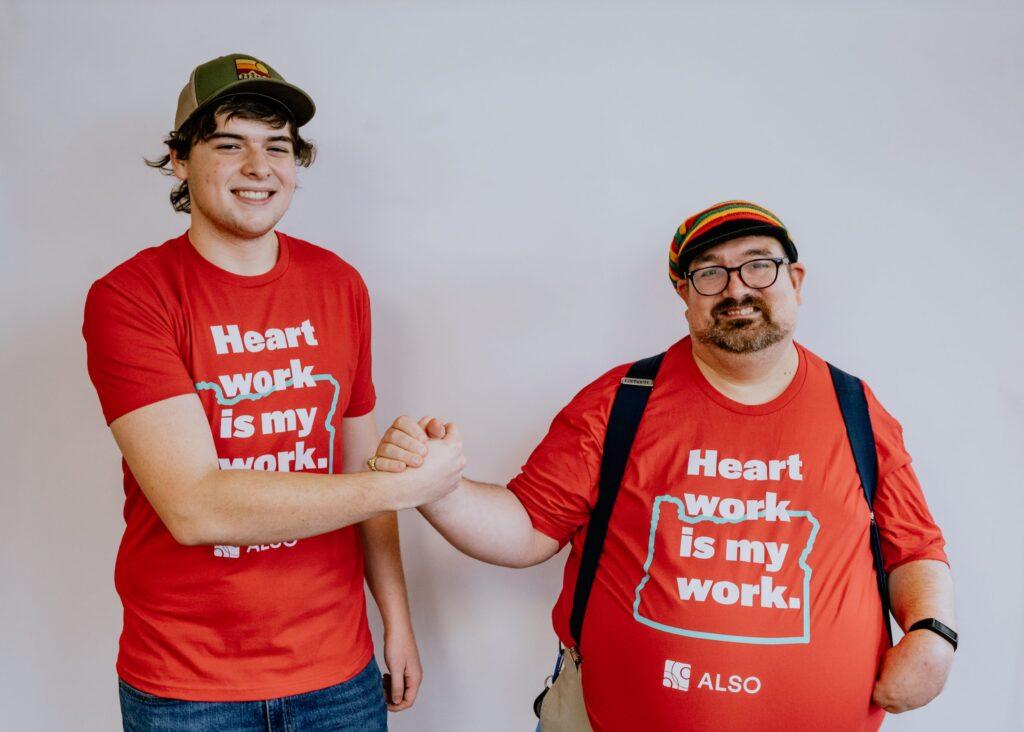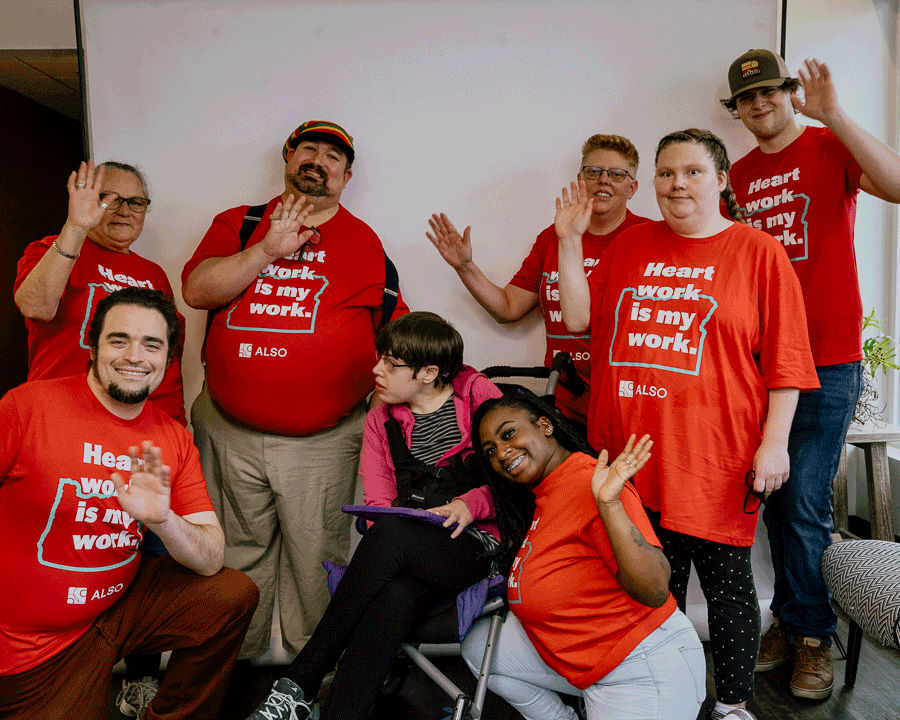Affordable housing for people with I/DD is in low supply. Learn what ALSO is doing to make a difference.
Affordable housing for people with I/DD is in low supply. Learn what ALSO is doing to make a difference.

If you Google “disability services in Oregon,” you’ll retrieve a variety of websites, everything from the government sites you need to companies offering to help you qualify for Social Security Disability. While government websites contain the information you want, they can be challenging to navigate.
Take heart. Much of the muddle is actually the result of progress. “From a historical perspective, the application process has definitely improved,” says Brett Turner, CEO of Advocates for Life Skills and Opportunity (ALSO). “People with disabilities and their families have choices where they didn’t in the past. Basically, there was no choice or selection of services or any of those things. It was frustrating.”
Unfortunately, the new wealth of choices has created some confusion about what services are available and how to get them—and the process isn’t made any easier by government jargon, unfamiliar acronyms, and confusing websites that are still trying to catch up to the changes.
As a disability support services provider, ALSO works with people experiencing intellectual and developmental disabilities to build a life of their choice. We believe that support should extend to guiding you through the process of applying for and receiving services. To that end, we’re happy to provide this straightforward guide to getting services for Oregonians with intellectual and developmental disabilities.
In Oregon, services are coordinated through individual counties. To begin the application process, find your county’s Community Developmental Disability Services (CDDP) office. You can either ask the office for an application form (and for help filling it out) or download the form from the Office of Developmental Disabilities Services (ODDS) Services and Eligibility page, using the links below:
Each county uses the same application form, though other processes may be different. Once you’ve completed the form, take it to your local CDDP office. Applications are available in English, Spanish, Russian, and Vietnamese.
After reviewing your application, your CDDP office will determine whether you or your family member is eligible for services. As an example, Multnomah County reports that they coordinate services for individuals diagnosed with intellectual and developmental disabilities, and that:
Multnomah County’s site lists potentially qualifying conditions as:
The information above is a general example. Actual eligibility is based on Oregon Administrative Rule (OAR) Eligibility Determination criteria (OAR 411-320-0080) and not all people with disabilities will meet the criteria.
If your CDDP office determines that you or your family member is eligible for services, you’ll be assigned a Service Coordinator, who will work with you to assess your needs. They’ll get to know you and learn what’s important to you. They’ll tell you about housing and employment options as well as any other services you or your family member may need. You’re welcome to bring along a legal representative, guardian, or family member to assist you.
The assessment period is a great chance to discuss your wants, needs, and goals. Don’t be afraid to be specific. For example, if you know that you’d like to stay in your home and receive In-Home Supports or that your family member wants to work part-time in a quiet environment, let your Service Coordinator know.
In most cases, once you and your Service Coordinator determine your needs and goals, you’ll be asked to decide whether to use your county or a brokerage for case management. If you need comprehensive services, such as 24-hour residential care, it’s required that the county oversees your case management. If you live in your own home or your family home, you may be able to choose between your county’s CDDP Service Coordinator and a Personal Agent at a Support Services Brokerage. “This is an important detail,” says ALSO’s Turner. “And it can be confusing. You can only pick one or the other.”
Both CDDP Services Coordinators and brokerage Personal Agents offer a choice of service providers, which are private, nonprofit, and for-profit organizations that deliver day services, residential services, and family support services. What’s the difference between your two choices? Your CDDP office has a wide reach and typically offers a broader choice of service providers. A brokerage is a private organization that provides some support services (though not all) and may offer a more personalized experience.
By the time you need to make a choice, you’ll probably have a good feel for the way your CDDP Service Coordinator operates. To understand the options that Oregon’s brokerages provide, you can learn more at My Brokerage, My Choice.
Once you have chosen either a county Services Coordinator or brokerage Personal Agent, you will choose a Service Provider for your actual supports. You’ll get a waiver that will pay for the services you need, and you’ll get to choose which services you want. You can receive services in your own home, your family home, a foster home, a home provided by a service provider, or in 24-hour residential care (previously called a group home). Services include:
Employment Services: Meaningful work can add a lot to life. If you or your family member is at least 18 years old, you can receive training, job placement, and on-site support. At ALSO, we work with each individual to identify career goals and aspirations, helping people to find purposeful employment that truly makes a difference in their lives, and in others’.
Residential Care Services: Some service providers offer 24-hour care in homes typically serving 3-5 people (typically 3 or fewer at ). Housing and room and board is provided, as well as assistance with activities of daily living (like bathing, eating, and dealing with money), helping residents to live the most independent life possible.
Supported Living Services: If you or your family member would like to live independently in your own home, Supported Living Services can help. You’ll get help with daily life skills, including medical assistance, personal care, money management, and many other skills.
You can choose from two payment structures:
There are more specific supported living services than we can list here, but they include transportation; help with activities of daily living; home modification; and behavioral, social, and community supports, from shopping to volunteering. ALSO offers all these services for both children and adults, all focused on individual needs.
Your Service Coordinator or Personal Agent will explain all the services available to you, and you’ll be able to visit the people providing the services before making any choices.
“It can be complicated to figure out how to make the right decisions,” says Turner, “but the good thing is that after choosing a service you’re not stuck in it forever. After a day or a week or a month or even five years, you can move to something different. That’s what’s great about the new process.”
To get services for an Oregonian with intellectual and developmental disabilities, take these steps:
If you have questions or would like details on eligibility or the application process, you can contact your county’s CDDP office. You can also visit the Oregon Office of Developmental Disabilities Services (ODDS) page, email them at odds.info@odhsoha.oregon.gov or call them at 503-945-5811, 800-282-8096 (toll free), or 800-282-8096 (TTY). ODDS also offers an informational brochure called “Choosing Developmental Disabilities Services for Children and Adults.”
Or you can talk to us at ALSO. We’ve been Advocates for Life Skills and Opportunity since 1997 (learn more about our mission and values) and we understand how the system works. Though this guide is straightforward, sometimes life isn’t. You may need help especially quickly (as when a living situation changes), or assistance navigating an especially cumbersome or time-consuming step. We’d be happy to steer you in the right direction.
If you are already part-way through the process and looking for services, we’d love to give you a virtual tour of our programs and show you how our person-centered approach can support you or your family member in a life that’s as independent—and as full—as possible. Contact us today at (503) 489-6565 (Portland) or (541) 410-0317 (Central, Eastern, and Southern Oregon).


Sign up for our newsletter to get our latest news, content, and job opportunities.
Help us ensure that everyone has the same opportunities in their home, workplace and community. Let’s make dreams!
